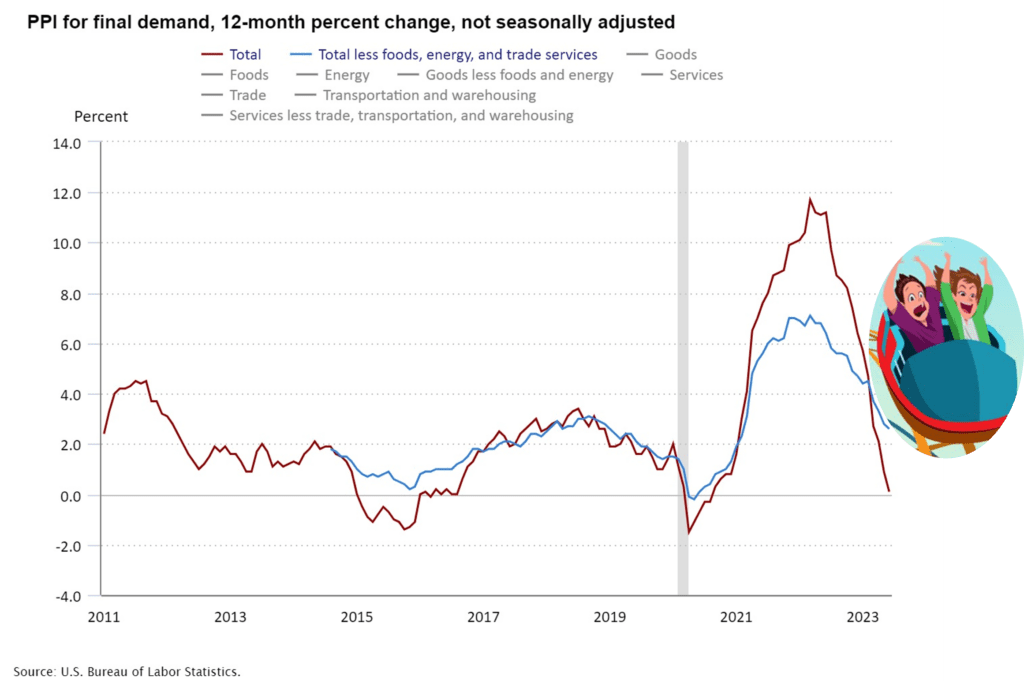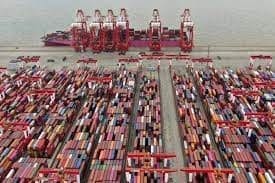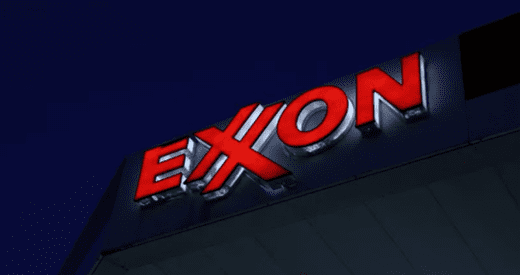 And just like that, it’s gone? “Inflation is sticky. Once it makes it way into the minds of consumers it becomes a self-fulfilling prophecy.” I have been hearing this from high-profile and well-respected economists for two years. I even heard one prominent just three days ago state that he believes the Federal Reserve has once again underestimated inflation. But the change in the US Consumer Price Index released on Wednesday (year-over-year, for June) came in at 3.0 percent. Isn’t that pretty close to the target range of the Fed? All items, less food and energy “core CPI” came in at 4.8 percent. This is clearly higher than 3 percent, but not alarming by any stretch. Then yesterday the Producer Price Index for June was released, with a change of only 0.1 percent year-over-year. One tenth on one percent price increase. That’s it? The inflationary environment is over? It seems abrupt to me, but I will embrace it. And now on to this week’s logistics news:
And just like that, it’s gone? “Inflation is sticky. Once it makes it way into the minds of consumers it becomes a self-fulfilling prophecy.” I have been hearing this from high-profile and well-respected economists for two years. I even heard one prominent just three days ago state that he believes the Federal Reserve has once again underestimated inflation. But the change in the US Consumer Price Index released on Wednesday (year-over-year, for June) came in at 3.0 percent. Isn’t that pretty close to the target range of the Fed? All items, less food and energy “core CPI” came in at 4.8 percent. This is clearly higher than 3 percent, but not alarming by any stretch. Then yesterday the Producer Price Index for June was released, with a change of only 0.1 percent year-over-year. One tenth on one percent price increase. That’s it? The inflationary environment is over? It seems abrupt to me, but I will embrace it. And now on to this week’s logistics news:
- Amazon’s record-breaking Prime Day
- Resilinc Releases list of top supply chain disruptions for H1 2023
- Department of Labor announces warehouse workplace hazard prevention program
- China’s exports record biggest decline in more than 3 years
- Union, employer reach tentative 4-year deal to end B.C. port strike
- Exxon’s $4.9 billion Denbury deal boosts energy transition plans
On the lighter side…
 The Amazon Prime Day event, stretching across July 11 and 12, was Amazon’s largest ever Prime Day, according to Amazon. Meanwhile, the first day of Prime Day, July 11, was the single largest sales day in the company’s history. It was also the biggest Prime Day event ever for Amazon’s independent sellers. Over the course of the two-day shopping event, Prime members purchased more than 375 million items worldwide. Summer months often bring a dip in sales for many retail organizations, and events such as Prime Day, and tax-free holidays such the one in my home state of Massachusetts can stimulate demand for inventory on-hand. I will take the Prime Day success as a sign that the retail sector remains strong and the roads will be packed with Prime delivery vehicles over the next couple days.
The Amazon Prime Day event, stretching across July 11 and 12, was Amazon’s largest ever Prime Day, according to Amazon. Meanwhile, the first day of Prime Day, July 11, was the single largest sales day in the company’s history. It was also the biggest Prime Day event ever for Amazon’s independent sellers. Over the course of the two-day shopping event, Prime members purchased more than 375 million items worldwide. Summer months often bring a dip in sales for many retail organizations, and events such as Prime Day, and tax-free holidays such the one in my home state of Massachusetts can stimulate demand for inventory on-hand. I will take the Prime Day success as a sign that the retail sector remains strong and the roads will be packed with Prime delivery vehicles over the next couple days.
 A total of 8,197 supply chain disruptions were recorded by Resilinc across all industries from January 2023 to June 2023, a 3% year-on-year increase, indicating the supply chain is stabilizing, the company said. Labor disruptions were one of the biggest disturbances during the first half of 2023, up 136% compared to the first half of 2022, including strikes, layoffs, labor protests and more. The ten biggest disturbances reported during the first half of 2023 were factory fires, mergers & acquisitions, business sales, leadership transitions, factory disruptions, legal actions, labor disruptions, cyber-attacks, port disruptions and recalls.
A total of 8,197 supply chain disruptions were recorded by Resilinc across all industries from January 2023 to June 2023, a 3% year-on-year increase, indicating the supply chain is stabilizing, the company said. Labor disruptions were one of the biggest disturbances during the first half of 2023, up 136% compared to the first half of 2022, including strikes, layoffs, labor protests and more. The ten biggest disturbances reported during the first half of 2023 were factory fires, mergers & acquisitions, business sales, leadership transitions, factory disruptions, legal actions, labor disruptions, cyber-attacks, port disruptions and recalls.
 The U.S. Department of Labor’s Occupational Safety and Health Administration launched a national emphasis program on July 13th to prevent workplace hazards in warehouses, processing facilities distribution centers, and high-risk retail establishments. In the past 10 years, warehousing and distribution centers have experienced tremendous growth with more than 1.9 million people employed in the industry. The Bureau of Labor Statistics data shows injury and illness rates for these establishments are higher than in private industry overall and, in some sectors, more than twice the rate of private industry. Under this three-year emphasis program, OSHA will conduct comprehensive safety inspections focused on hazards related to powered industrial vehicle operations, material handling and storage, walking and working surfaces, means of egress and fire protection.
The U.S. Department of Labor’s Occupational Safety and Health Administration launched a national emphasis program on July 13th to prevent workplace hazards in warehouses, processing facilities distribution centers, and high-risk retail establishments. In the past 10 years, warehousing and distribution centers have experienced tremendous growth with more than 1.9 million people employed in the industry. The Bureau of Labor Statistics data shows injury and illness rates for these establishments are higher than in private industry overall and, in some sectors, more than twice the rate of private industry. Under this three-year emphasis program, OSHA will conduct comprehensive safety inspections focused on hazards related to powered industrial vehicle operations, material handling and storage, walking and working surfaces, means of egress and fire protection.
 China’s General Administration of Customs released import and export data for the month of June. The dollar value of China’s exports plunged 12.4% in June from a year ago. The percentage decline was the biggest that the world’s second-largest economy has recorded since February 2020. Meanwhile, Imports declined 6.8% in June from a year ago. China’s exports to the U.S. plunged by 24% in June to $42.7 billion from a year ago, while imports fell 4% to nearly $14 billion, according to CNBC calculations of official data accessed via Wind Information. In my opinion, this data is more of an indication of the recent geopolitical shifts related to global trade relationships than an indication of general economic slowdown.
China’s General Administration of Customs released import and export data for the month of June. The dollar value of China’s exports plunged 12.4% in June from a year ago. The percentage decline was the biggest that the world’s second-largest economy has recorded since February 2020. Meanwhile, Imports declined 6.8% in June from a year ago. China’s exports to the U.S. plunged by 24% in June to $42.7 billion from a year ago, while imports fell 4% to nearly $14 billion, according to CNBC calculations of official data accessed via Wind Information. In my opinion, this data is more of an indication of the recent geopolitical shifts related to global trade relationships than an indication of general economic slowdown.
 The 13-day British Columbia port strike appears to be over after the International Longshore and Warehouse Union Canada and the B.C. Maritime Employers Association agreed to a tentative four-year deal on Thursday morning, both parties have confirmed. The B.C. Maritime Employers Association (BCMEA) said work would begin again with Thursday’s 4:30 p.m. PT shift. About 7,400 workers have been on strike since July 1, halting shipments in and out of about 30 ports in B.C., including Canada’s largest, the Port of Vancouver.
The 13-day British Columbia port strike appears to be over after the International Longshore and Warehouse Union Canada and the B.C. Maritime Employers Association agreed to a tentative four-year deal on Thursday morning, both parties have confirmed. The B.C. Maritime Employers Association (BCMEA) said work would begin again with Thursday’s 4:30 p.m. PT shift. About 7,400 workers have been on strike since July 1, halting shipments in and out of about 30 ports in B.C., including Canada’s largest, the Port of Vancouver.
 Exxon Mobil Corp (XOM.N) on Thursday agreed to buy Denbury Inc (DEN.N) for $4.9 billion to accelerate its energy transition business with an established carbon dioxide (CO2) sequestration operation. The acquisition, which sent both companies’ shares lower, gives Exxon ready-made CO2 transportation and highlights its bets on making carbon capture a profitable business. U.S. tax credits for reducing planet-warming gases have set off a race to build carbon capture sites. Denbury CEO Chris Kendall said in a statement that “significant capital and years of work” are required to fully develop its CO2 business, making deep-pocketed Exxon “the ideal partner with extensive resources and capabilities.”
Exxon Mobil Corp (XOM.N) on Thursday agreed to buy Denbury Inc (DEN.N) for $4.9 billion to accelerate its energy transition business with an established carbon dioxide (CO2) sequestration operation. The acquisition, which sent both companies’ shares lower, gives Exxon ready-made CO2 transportation and highlights its bets on making carbon capture a profitable business. U.S. tax credits for reducing planet-warming gases have set off a race to build carbon capture sites. Denbury CEO Chris Kendall said in a statement that “significant capital and years of work” are required to fully develop its CO2 business, making deep-pocketed Exxon “the ideal partner with extensive resources and capabilities.”
 Smugglers’ Notch in northern Vermont is one of my favorite New England mountain locations. It is a dramatic, narrow pass with steep cliffs on both sides (and beautiful ski areas on each side as well). The Smuggler’s Notch road is a narrow road with hair pin turns that should technically be one way in parts, and it is closed during the winter months. Well, the second truck in just a few days has ignored plenty of signage and perhaps some measure of common sense by getting itself stuck on the Smuggler’s Notch stretch of Vermont state route 108. Funnily enough, the near-constant stream of trucks getting stuck on the clearly marked, winding and treacherous seasonal road has become a source of entertainment for locals. The Rotary Club in nearby Stowe actually had a betting pool on when the first truck would get stuck, and raised $6,000. The winner of the prize will get half that, with the other half going to the club.
Smugglers’ Notch in northern Vermont is one of my favorite New England mountain locations. It is a dramatic, narrow pass with steep cliffs on both sides (and beautiful ski areas on each side as well). The Smuggler’s Notch road is a narrow road with hair pin turns that should technically be one way in parts, and it is closed during the winter months. Well, the second truck in just a few days has ignored plenty of signage and perhaps some measure of common sense by getting itself stuck on the Smuggler’s Notch stretch of Vermont state route 108. Funnily enough, the near-constant stream of trucks getting stuck on the clearly marked, winding and treacherous seasonal road has become a source of entertainment for locals. The Rotary Club in nearby Stowe actually had a betting pool on when the first truck would get stuck, and raised $6,000. The winner of the prize will get half that, with the other half going to the club.
That’s all for this week’s news. Enjoy the song of the week, East Bound and Down by Jerry Reed.

















